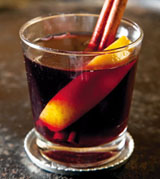Spiced Wine
Glühwein
Warming cinnamon thoroughly suffuses this mulled wine; the German name for it, in fact, translates literally as “glow wine.” Especially popular at Christmastime, glühwein is plenty potent on its own, though aficionados have been known to ask for it mit schuss, spiked with a shot of rum. Pictured, a Christmas eve dinner in the Berlin home of Werner Blanck, at which generous portions of glühwein were consumed.
1 750-ml bottle medium-bodied red wine, such as zweigelt
½ cup sugar
8 whole cloves
4 lemon wedges
4 4-inch sticks cinnamon
Serves 4
Bring ingredients to a boil, stirring occasionally, in a 4-qt. saucepan and remove from heat. Discard cloves. Ladle wine into 4 glasses and garnish each with 1 of the cinnamon sticks and 1 lemon wedge. Serve hot.
COOKING NOTE Mulling is a method of flavoring liquid by heating it with herbs, spices, and other aromatics. Using whole cinnamon sticks, rather than powder, leads to a gentler extraction of the oils, and a softer flavor. Other whole spices, such as cardamom, nutmeg, and mace, will work just as well in this recipe.
Holiday Cheer
In northern Europe, mulled wine announces the arrival of the Christmas season. Vendors at winter markets that pop up throughout the region sell steaming mugs of it, while home cooks brew bubbling pots bound for the holiday table. In fact, though, the festive drink—typically a blend of red wine, citrus fruit, spices, and sugar—predates Christmas by thousands of years. Early civilizations, as far back as 5000 b.c., used heated, spiced wines for many purposes, ranging from the gastronomic to the religious. Romans drank a version called hippocras, named for the Greek doctor Hippocrates, because it was believed to have healing properties. The expansion of the spice trade between Europe and the East in the seventeenth century made the flavors we associate with the drink—such as cinnamon, nutmeg, cloves, and mace—more readily available, and today, many countries have their own recipe for mulled wine. In Sweden, glögg is scented with cardamom and sometimes fortified with hard liquor; the British make wassail, fragrant with ginger, nutmeg, and other spices. In Germany, it’s glühwein, a comforting concoction heady with cinnamon and holiday cheer.

